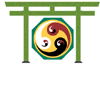
A Book of Little Traditions

|
minzoku NEO-shintô A Book of Little Traditions |
|
|
ToC |
||
|
Blog — 14
On ofuda
The following statement was made during a discussion of where to obtain ofuda, "… ofuda needs to come from a jinja since there are purifications and energies that are unique to those coming from jinja."
Which is true as far as recognizably Japanese kami and jinja are concerned. But it does present something of a conundrum for those of us who practice one of the many forms of minzoku shintô outside of Japan.
Many of us aren't of Japanese descent or for that matter members of an upper-class. Does it make sense for us to revere kami from over 5000-plus miles away, or exalted kami that are unlikely to hear us or pay attention to us if they do hear us. Wouldn't it better for us to attend to the local kami — our neighbors?*
Japanese jinja don't have ofuda for these kami or for that matter even know them well enough to make ofuda for them. And few us overseas have a local jinja or a shinshoku to go to, so where are we going to get ofuda for our kamidana?
The obvious answer is to do as our ancestors have done and rely on our local spiritual resources — those members of our community who have some experience with dealing with those of our neighbors who are other. They may be your grandparents or the old person across the street or down the road. They'll be recognized by their attunement to land and its occupants.
These are the people who should be creating, purifying, and blessing the ofuda to the local kami. That ofuda may or may not be as "good" as one from a jinja. Craftsmanship is as much a matter of experience as of knowledge; someone's possession of a degree is no guarantee of the ability to apply what knowledge they have.
Speaking of the lack of local shrines; let's remember that many shrines started out as family or village shrines. They were created to fill a local need, and so it will happen for those of us overseas. When groups decide to invest the effort, our shrines will appear; staffed by locals.
* Addendum:
This is the comment that brought down on me the wrath of the "Shinto Police" — a small group of essentialists who apparently believe that their way is the only way to practice shintô. This in no way denigrates the Japanese kami. When I'm in their country, I'll honor them. Until then, I'll stick to dealing with the local kami I have to live with.
I have to say in an odd way I'm grateful to the SP as it made me more aware of all the different ways existentialists practice shintô.
|
||
|
|